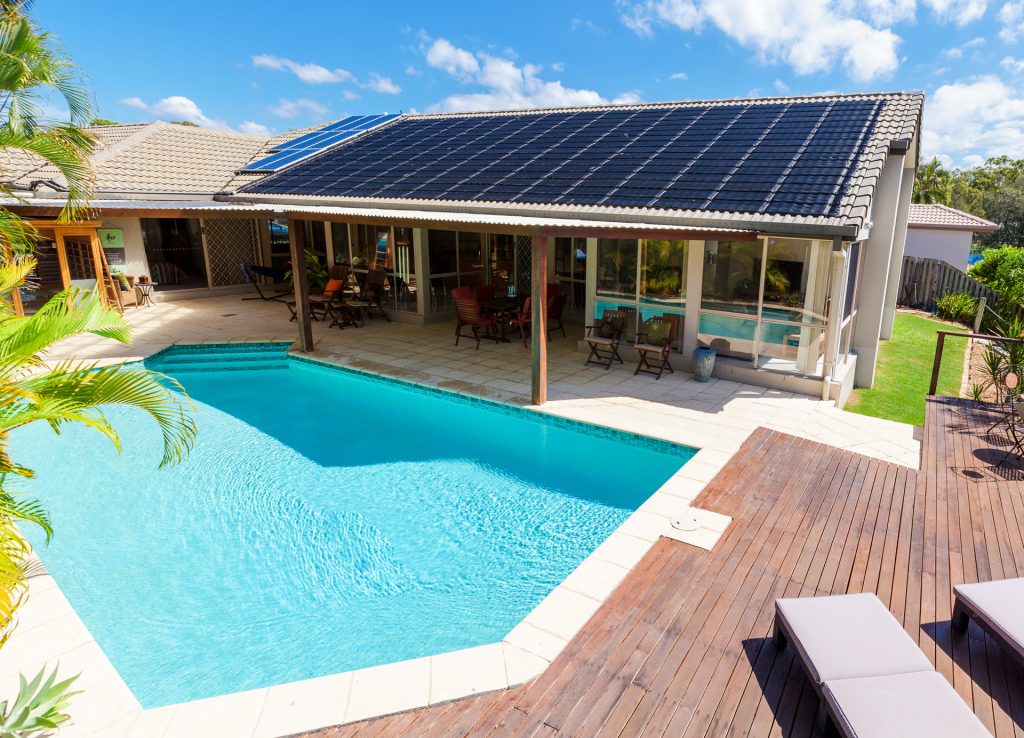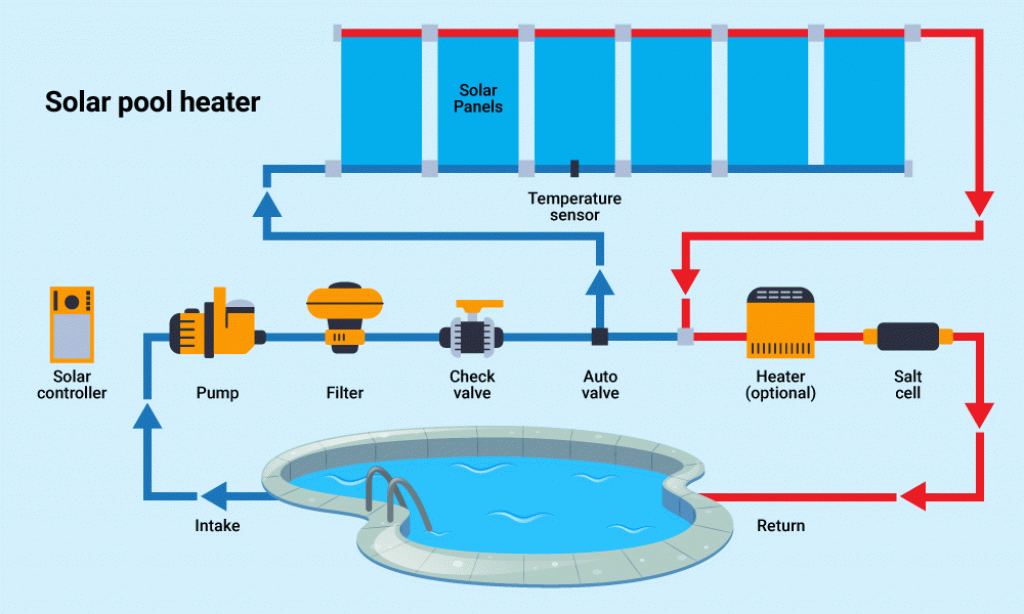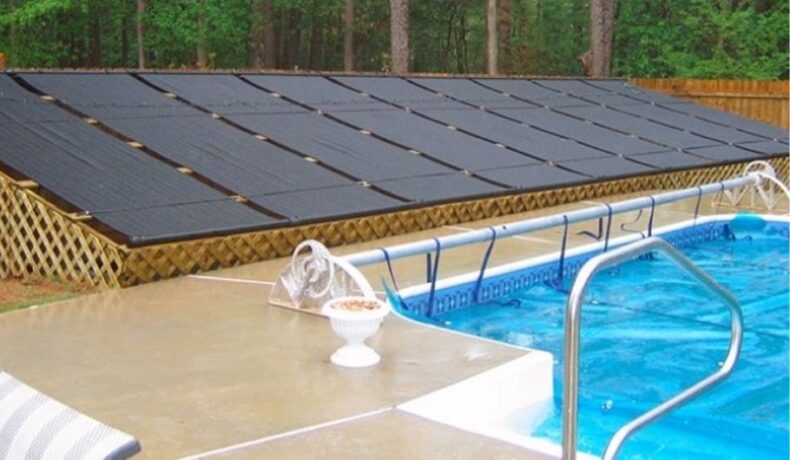The heating of outdoor swimming pools is an excellent application for solar energy. Why? Because the heat demand matches well with the availability of solar energy.
If you think about it, a pool itself is a large heat storer and the temperature level is low. In other words, solar energy heating and pools were always going to be a match made in heaven- it was inevitable.
What’s more, in many cases solar pool-heating is already competitive with conventional energy sources, such as natural gas or oil, when total heat cost is considered, i.e., investment and energy cost.
Let’s have a closer look at how your pool can benefit from this form of green tech.
Table of Contents
Heating Your Pool With Solar Panels
First Things First
Before we get into the nitty-gritty of solar pool heating, it’s important that we clarify the type of solar tech used for this process.
Why?
Well, many of you out there might assume that this article revolves around using photovoltaic (PV) solar panels to heat swimming pools- this is not the case.
We will in fact be referring to solar thermal panels.
Why Solar Thermal Panels?

Source: Lex Pools
So why would heating a pool require solar thermal panels as opposed to photovoltaic ones?
The answer is simple – the primary function of a PV system is to produce electricity, while the primary function of a solar thermal system is to produce heat.
In addition to the above, solar thermal panels are on average, more efficient than their PV cousins. To be more specific, a solar thermal system’s efficiency level can get up to 70%. This is in contrast to a PV system, which tends to have an efficiency level of 15% – 20%.
The Components
According to the U.S. Department Of Energy (EIA), most solar pool heating systems include the following components:
- Solar Collector – Also known as a solar thermal panel. Pool water circulates through this component so that it can be heated by the suns energy.
- Filter – The filter helps remove debris from the water before it travels back to the collector.
- Pump – The pump circulates water through the filter, to the collector and back to the pool.
- Flow Control Valve – This is an automatic or manual device that diverts pool water through the solar collector.
The Process

Source: SolarReviews
Fortunately, the process of heating a pool via solar thermal is very simple.
Basically, pool water is pumped through the filter and then through the solar collector(s), where it’s heated before it returns to the pool.
Some systems however include sensors and an automatic or manual valve to divert water through the collector(s) when the collector temperature is a fair bit higher than the pool temperature.
When the temperature of the collector and pool are at a similar level, the filtered water bypasses the collector(s) and returns directly to the pool.
How Efficient Is Heating Your Pool With Solar Panels?
Earlier on, we mentioned that a solar thermal-based system can have an efficiency level of up to 70%.
“That’s wonderful and all, but where’s the proof?”
The Proof Is In The Pudding
This article cites the following examples of solar collector heating efficiency:
Example 1:
In India, a heating system with solar collectors was designed by Dang (1986), to supply heat for an outdoor swimming pool (OSP). The author discovered that the calculated energy efficiency of the solar collectors could reach up to 53.3%.
Example 2:
Based on data from 5 OSPs heated by solar collectors in Switzerland, Molineaux et al. (1994a) reported that the mean daily efficiency of the solar collectors in this system could reach up to 60% if the system operated in optimal conditions.
While neither of those examples quite hit the 70%, they aren’t too far off.
Is It Possible To Determine The Efficiency of A Solar Pool Heating System?
Yes, it is in fact entirely possible to do this based on the collector’s thermal performance rating – if available.
This rating can be measured in 4 ways:
- Btu (British thermal unit) per square foot per day, or Btu/(ft2day).
- Kilowatt hours (kWh) per square meter, or kWh/(m2day).
- Btu per day, which is the rating in Btu/(ft2day) multiplied by the area in ft2.
- kWh per day, which is the rating in kWh/(m2day) multiplied by the area in m2.
The Rule Of Thumb
The higher the number, the greater the solar energy collection efficiency.
However, weather conditions, instrumentation accuracies, other external factors can vary. As such, the thermal performance of any two collectors should be considered similar if their ratings are within 25 Btu/(ft2day) of each other.
IMPORTANT: High-efficiency solar collectors will not only reduce your annual operating costs, but they may also require less space to heat your pool.
How Much Does It Cost To Heat Your Pool With Solar Panels?
According to the EIA, a solar pool heating system can set you back between $2,500 to $4,000 while providing a payback of between 1 to 7 years. Keep in mind, this does depend on the availability of solar in your area as well as local fuel prices.
We know this does seem a tad pricey, but these systems typically last longer than their gas and heat pump counterparts, so the investment is worthwhile.
Factors That Determine Your Cost & Payback Period
Your actual cost and payback depend on the following factors:
- The availability of solar in your area.
- The size of your system.
- Determining the correct orientation and tilt for your collector.
- The efficiency of your system.
- The codes and regulations that govern your area.
How To Estimate & Compare Costs:
Before you go about purchasing your very own solar pool heating system, you can estimate and compare the costs of using different solar collectors.
To estimate and compare costs, you need to know the following:
- The collectors’ thermal performance rating(Btu/day).
- The total number of collector panels or piping needed to heat your pool.
- Total installation cost of the system.
Once this is done, you can calculate a collector’s energy output per USD spent or invested using these formulas, courtesy of the EIA:
(Btu/day X # of collector panels/piping modules) ÷ total installed cost of system = Btu/$ per dollar spent
Working Example
(27,900 X 4) Btu ÷ $3,000 = 37.20 Btu/day per dollar spent
If you only know the prices and thermal performance ratings (Btu/day) of collectors, you can use the following formula to calculate the energy output for each USD spent or invested for different collectors:
Btu/day ÷ collector price = Btu/day per dollar spent
Working Example
21,000 Btu ÷ $387 = 54.26 Btu/day per dollar spent
7 Benefits of Heating Your Pool With Solar Panels
The Sun’s Energy Is Free
Heating a pool isn’t exactly cheap, but the sun isn’t exactly going to be sending bills your way any time soon, now is it? This is well and truly the most obvious and significant advantage of heating your pool via solar energy.
Sure, you have to stomach the initial investment costs of a solar thermal system but the heating you’ll obtain from it is free of charge.
So if you reduce your utility bill at the end of the month, a solar pool heater is the way to go.
Ol’ Reliable
Not only are these solar heating systems capable of saving you money, but they’re also highly dependable.
Thanks to advancements in technology – and the ability to add a storage tank to your setup – you can enjoy warm pool temperatures, even in the colder months.
Green Energy Is Clean Energy
Monthly energy savings are great, as is having a system that’s reliable, but investing in a system that also helps the environment – now that’s an absolute winner!
According to the Association of Pool & Spa Professionals (APSP), there are 10,4 million residential pools and 309,00 public swimming pools in the U.S. While it’s safe to say that not every one of those pools uses a heating system, we’re confident that a fair amount of them do.
Imagine then, how much of a positive environmental difference solar thermal pool systems can make on both a micro and macro scale.
So Very Accomodating
Do you have a pool with an unusual size and/or shape? Are you unsure about whether or not your property has the space to accommodate a heating system?
If so, don’t stress. When it comes to space, solar heaters are incredibly versatile, you can set them up virtually anywhere.
Quiet As A Mouse
Okay, not quite. But in their defense, solar pool heaters are nowhere near as noisy as their more conventional cousins.
They have a reputation for being quiet so you’ll be able to enjoy the heated water without the added, unwanted sound effects.
This is because the collection of heat takes place through the sun’s rays instead of motors. And if you invest in a really quiet pump for your solar panel pool heater, you’ll have an almost non-existent level of noise.
Maintenance Is A Breeze
If maintenance is not your thing, then solar heaters are a great choice.
Unlike other types of heaters, they’re not as prone to blockages and there are no fans or motors that you need to worry about.
What’s more, your solar heater should provide you with comfortable pool temperatures for 15-20 years. In fact, they can last for even longer than that.
Flexibility Is Key
Last but not least, if you decide that you would like to increase the size of your pool or the speed at which it heats up, you can very easily add more panels without interfering with your current setup.
What Temperature Can Solar Panels Heat Your Pool too?
The general consensus is that solar heating your pool can increase its temperature by between 8°C – 12°C (46.4°F – 53.6°F).
The following statements from two pool heating companies are testament to this estimate:
“If you follow our recommended number of panels and have proper exposure to the sun (at least 10 am to 3 pm), your pool temperature will be 6 to 12 degrees warmer than it was before you heated it, under the same weather conditions.” – Hi-Temp Solar Heating Solutions
“Depending on the season and if the pool has a thermal blanket on or not, you should be getting between a 6°C to 13°C increase in your swimming pool water temperature…” – ITS Heat Pumps & Solar
Final Thoughts
Imagine for a moment that you’re in the market for a pool with a good heating system. You’re torn between the different types of pool heating technology out there, but you’re eyeing solar.
Before you look elsewhere, let’s recap what solar thermal panel heating can do for you:
When you look at all of the benefits, the choice is obvious – go solar. It’s the only way.

